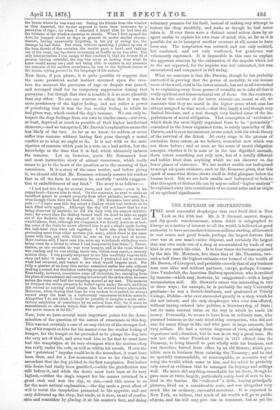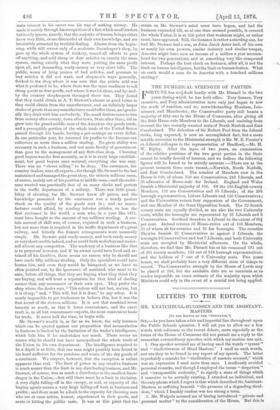THE EMPEROR OF SHOPKEEPERS.
THE most successful shopkeeper that ever lived died in New York on the 10th inst. Mr. A. T. Stewart, mercer, draper, and dry-goods warehouseman, whose death is telegraphed to Europe as a matter of interest to all the world, is believed on good authority to have accumulated sixteen millions sterling, all invested in real estate and good bonds, perhaps the largest fortune than was at one man's entire disposal, and certainly the largest that was ever made out of a shop or accumulated by trade of any kind in one man's life-time. It is four times the fortune acquired by the late Mr. Morrison, five times that of Mr. Thornton, two- and-a-half times the highest estimate ever formed of the wealth pf Mr. Brown, of Liverpool, and probably exceeds that of any business man now alive and without partners, except, perhaps, Commo- dore Vanderbilt, the American Railway speculator, who is credited by rumour—wbich may,:however, be exaggerated—with a larger accumulation, still. Mr. Stewart's career was interesting in two or three ways ; for example, he is probably the only University graduate—he was a Scotch-Irishman, and graduated at Trinity College, Dublin—who ever succeeded greatly in a shop which he did not inherit, and the only shopkeeper who ever was offered, without having entered into politics, a Secretaryship of State ; but its main interest turns on the way in which he made his money. Personally, he seems to have been an ordinary man, who pursued business as the only, interesting occupation, who did not care for many things in life, and who gave in large amounts, but very seldom. He had a certain largeness of view, arising from experience and education, but he was in no way a great man. He was not able, when President Grant in 1871 offered him the Treasury, to bring himself to part wholly with his business, and was therefore barred from office by an old Statute, which pro- hibits men in business from entering the Treasury ; and he had no specially commendable, or contemptible, or eccentric way of using the wealth which came to him, and for which he probably only cared as evidence that he managed his buyings and sellings well. He never did anything remarkable for his State, though he gave once or twice largely, particularly a ship-load of corn to Ire- land in the famine. He "collected" a little, buying principally pictures, lived on a considerable scale, and was altogether very much like an ordinary, successful merchant. It is expected in New York, we believe, that much of his wealth will go to public objects, and his will may give rise to, comment, but as yet the main interest in his career was his way of making money. He made it mainly through his recognition of a fact which small traders habitually ignore, namely, that the majority of human beings either know very little, or are distrustful of their own knowledge, and are irresistibly attracted by truthful dealing. Almost from the begin- ning, while still owner only of a moderate linendraper's shop, he gave up the whole system of trickery, ceased all efforts to pass off anything, and sold cheap or dear articles on exactly the same system, stating exactly what they were, putting the same piofit upon all, and demanding ready-money or very short bills. The public, weary of lying praises of bad articles, and pressure to buy articles it did not want, and shopmen's ways generally, flocked to the shop where it was sure that the article sold was what it professed to be, where there was the same readiness to sell cheap goods as dear goods, and where it was let alone, and by-and- by the country shopkeepers thronged there too. They found that they could obtain at A. T. Stewart's almost as good terms as they could obtain from the manufacturer, and an infinitely larger choice of goods than any manufacturer could offer them, and gradu- ally they dealt with him exclusively. The small dealers came to him from county after county, town after town, State after State, till he grew into the grand middle-man of the American dry-goods trade, and a perceptible portion of the whole trade of the United States passed through his hands, leaving a per-centage on every dollar. In one particular year, he returned his profits to the Income-tax collectors as more than a million sterling. No great ability was necessary in such a business, and not more faculty of government than goes to the management of any first-class shop. Choosing good buyers was the first necessity, as it is in every large establish- ment, but good buyers once secured, everything else was easy. There was no "clever selling" to be done. The customers, the country dealers, were all experts—for though Mr. Stewart to the last maintained and managed the great shop, the sixteen millions came, of course, mainly out of his position as middle-man—and the assist- ance wanted was practically that of so many clerks and porters in the traffic department of a railway. There was little possi- bility of cheating, for Mr. Stewart knew all prices, and the knowledge possessed by his customers was a nearly perfect check on the quality of the goods sent in ; and no manu- facturer could afford, by sending inferior articles, to lose the first customer in the world, a man who, in a year like 1871, must have bought to the amount of ten millions sterling. A cer- tain amount of skill was, of course, required in such a business, but not more than is required in the traffic department of a great railway, and latterly the finance arrangements were unusually simple. Mr. Stewart paid ready-money, and toak ready-money or very short credits indeed, and so could both underbuyand under- sell almost any competitor. The tendency of a business like that is to perpetual increase, and if its owner could have lived and re- tained all his faculties, there seems no reason why he should not have made fifty millions sterling. Only the specialists could have beaten him, and even they would be hampered, as we have so often pointed out, by the ignorance of mankind, who want to be sure, before all things, that they are buying what they think they are buying, and will trust a reputation for that kind of dealing sooner than any assurances or their own eyes. They prefer the shop where the dealer says, "This colour will not last, ma'am, but it is cheap," and, " This will, but it is dear," to any other. It is nearly impossible to get tradesmen to believe this, but it was the first secret of the sixteen millions. It is not that mankind loves honesty so much, as that it loves convenience, and the exact truth is, to all but consummate experts, the most convenient basis for trade. It saves half the time, to begin with.
Mr. Stewart's wealth is, as far as we know, the only instance which can be quoted against our proposition that accumulation in business is limited by the limitation of the trader's intelligence, which fails him if he undertakes too much. There seems no reason why he should not have monopolised the whole trade of the Union in his own department. The intelligence required to be a depot is so little, that one man might possibly have found in his head sufficient for the purchase and resale of the dry goods of a continent. We suspect, however, that the exception is rather apparent than real. The limit of power in any creative business is much nearer than the limit in any distributing business, and Mr. Stewart, of course, was as much a distributor as the smallest linen- draper in the Union,—but still there must be a limit in the latter. A very slight falling-off in the energy, or zeal, or capacity of the buying agents means a very large falling-off both in business and profits ; and there must be a limit to the capacity for choosing men who are at once.active, honest, experienced in their goods, and acute in hitting the public taste. It was at this point that the
strain on Mr. Stewart's mind must have begun, and had the business expanded till, as at one time seemed possible, it covered the whole Union, it is at this point that weakness might, or rather must, have appeared. Still, the instance is rather a startling one, for had Mr. Stewart had a son, as John Jacob Astor had, of his own or nearly his own powers, similar industry and similar temper, America might have seen an income of a million a year accumu- lated for two generations, and at something very like compound interest. Perhaps the best check on fortunes, after all, is not the limit on human intelligence, but the limit on human desires. What on earth would a man do in America with a hundred millions sterling?



































 Previous page
Previous page